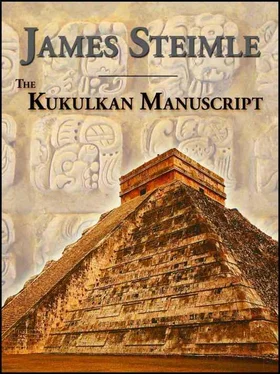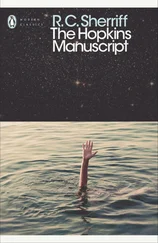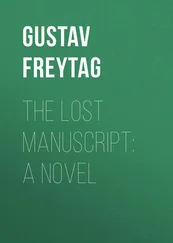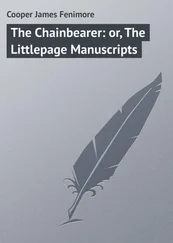James Steimle - The Kukulkan Manuscript
Здесь есть возможность читать онлайн «James Steimle - The Kukulkan Manuscript» весь текст электронной книги совершенно бесплатно (целиком полную версию без сокращений). В некоторых случаях можно слушать аудио, скачать через торрент в формате fb2 и присутствует краткое содержание. Жанр: Прочие приключения, на английском языке. Описание произведения, (предисловие) а так же отзывы посетителей доступны на портале библиотеки ЛибКат.
- Название:The Kukulkan Manuscript
- Автор:
- Жанр:
- Год:неизвестен
- ISBN:нет данных
- Рейтинг книги:5 / 5. Голосов: 1
-
Избранное:Добавить в избранное
- Отзывы:
-
Ваша оценка:
- 100
- 1
- 2
- 3
- 4
- 5
The Kukulkan Manuscript: краткое содержание, описание и аннотация
Предлагаем к чтению аннотацию, описание, краткое содержание или предисловие (зависит от того, что написал сам автор книги «The Kukulkan Manuscript»). Если вы не нашли необходимую информацию о книге — напишите в комментариях, мы постараемся отыскать её.
The Kukulkan Manuscript — читать онлайн бесплатно полную книгу (весь текст) целиком
Ниже представлен текст книги, разбитый по страницам. Система сохранения места последней прочитанной страницы, позволяет с удобством читать онлайн бесплатно книгу «The Kukulkan Manuscript», без необходимости каждый раз заново искать на чём Вы остановились. Поставьте закладку, и сможете в любой момент перейти на страницу, на которой закончили чтение.
Интервал:
Закладка:
“Ah. ‘A city that is set on an hill cannot be hid…Let your light so shine before men, that they may see your good works, and glorify your Father which is in heaven.’”
“Shakespearean all of a sudden?”
“Matthew 5:14 and 16.” Pulling a legal pad from beneath two others, he flipped through the sheets and handed it to Alred.
“What am I looking at,” she said, examining a chart without lines.
“On the right side we have the English,” Porter said, interlocking his fingers as he relaxed.
“ This is English?!?” Alred squinted at the scribbled words.
Porter cocked his head to the left and wiggled a finger in his ear. “My second grade teacher said I was doomed if I didn’t practice better penmanship. Thank goodness for the personal computer! Anyway, I feel a little rushed.”
“This supposed to be Mayan?” she said, looking at logograms drawn in the middle column of the sheet.
Porter leaned forward, snatched the pad from her, and pointed at one Mayan glyph on the page. “What’s this?”
“I don’t know. You said this was supposed to be Mayan? Looks like a hand.”
“Right. How do you pronounce that?”
“If this is your best attempt at Mayan, I’d say this character is manik…pronounced keh.”
“Look at this letter,” Porter said, sliding his finger left to a more simple squiggle.
“Is that supposed to be a hand?” Alred said. “Let me guess. You pulled it off the codex.”
Porter shook his head. “It’s the Hebrew letter k. It is kaph, a hand. Tell me if I’m mistaken, but doesn’t the Yucatec Mayan kab have the same meaning?”
Alred looked up, scanning her memory. “It does, if I recall.”
“The West-Semitic word for hand or palm, represented by the image of a hand in ancient times, was also pronounced… kap. As far as our current study goes, these connections shouldn’t surprise us. There is a link between the Middle East and Mesoamerica. Both Dr. Albright and Dr. Peterson have publicly noted it.”
“I recently found a paper from a professor of the University of Calgary who supposes a connection between three letters of the Mayan calendar to the Hebrew alphabet,” said Alred.
Porter lifted a finger. “I have some of those here! The Hebrew lamed and the Mayan lamat. A similarity so obvious, one might suppose it to be complete fraud created by those desiring to prove relationships between the Old and New Worlds. Yet here it is, solid fact. Tell me it’s a coincidence.”
“But these correlations are not proven.” Alred pulled a chair from a nearby table and sat on it, looking around at the quiet library. Was anyone else here? Most of the lights had been turned off. She smelled moist carpets and shifted the points of her heels on the wood floor running from the window behind Porter to the stairway some thirty feet behind her. “Are they trying to conserve energy here?”
“These logographic systems sound too much alike to go unnoticed. Did you know the Chinese character for boat is made up of three pictures with distinct definition? The first meaning a vehicle, the second is the number eight, and the third, a clear depiction of a mouth. A vehicle with eight mouths?”
“Does this have an application to Mesoamerican languages?” said Alred, wrinkling her brow.
“Both have connections to Biblical tongues,” said Porter, lifting an open hand. “Noah’s ark had eight mouths: Three sons and their wives, and also Noah and his wife.”
“Doesn’t folklore school us that Noah brought two of every kind of mouth on the planet?”
Porter smiled, but his excited eyes didn’t waver. “More, actually. But…there were only eight humans on the ark. All ideograms, like Egyptian, Mayan, and Chinese-in fact all letters! — originate from preconceived mental images. Why did the ancient Chinese, when desiring to write the word boat, describe such a detailed picture that has no reference to floating or even water? Why was a vehicle with eight people on it so clearly representative of this particular word?”
“You’re shooting in the dark,” Alred sighed.
“Isn’t that what all scholars do, followed by an analysis of facts explaining their assumptions?” said Porter.
“What’s the rest of this?” Alred said, looking at the pad full of foreign figures and badly scrawled English.
“Ever heard of the Popol Vuh, a Mesoamerican codex written not long after the Spanish conquered the area?”
“Did you forget my area of expertise?” Alred smiled. “ The Book of the Council. I’ve quoted it. It was created by American Indians of the Quiche tribe, the most powerful nation in the area and also a branch of the Maya.”
“Right, in 1524, a general under Cortez forced the Quiche to surrender, burning their capital city, Utatlan.”
“You know some American history,” Alred said, her eyes relaxing. “The Popol Vuh was one of the few books that survived the period. Most of the native libraries were decimated by the Spanish inquisition, ruining our chance to obtain a detailed history of the Maya.”
“Some Mayan codices survived the Conquest,” Porter said quickly.
“Most are fakes.” Alred crossed her legs. “The Popol Buj, or Popol Vuh as you call it, was only one of four authentic works we know of. What about it?”
“Well, you know it is a collection of oral tales recorded by the Quiche nobles,” said Porter.
“I am well aware of the book’s background, Porter. Do you also know that we don’t have the original?”
“Is that supposed to preclude what I’m about to say?”
Alred paused. “I’m the Mesoamerican scholar here.”
“I…realize that. That’s why I think you’ll appreciate this. Especially in light of our new study. I have the book right here.” He picked up an English copy from under a thick lexicon of Hebrew words. “Listen to this: ‘… they planned the creation.’”
“Is that why we’re talking about the Popol Vuh?”
Porter looked at her, shock on his face.
Was she supposed to understand something in all this rhetoric?
“It says the same thing in the Book of Genesis.”
“I thought the Bible defines one god as the creator,” Alred said as Porter reached into his briefcase and pulled out his scriptures.
He put them on the table and Alred’s eyes widened. The black book with worn gilding was at least three inches thick, and as he opened it, she could see the onion skin pages. “Here. Genesis 1:26. ‘And God said, Let us make…’” He shot his face up at Alred’s.
“What happened to Judeo-Christian Monotheism?” said Alred.
“ Vayomer elohim vaaseh adam btsalmenu kdmutenu. The Hebrew word for God in this verse is Elohim. As in Cherub im and Seraph im, the — im implies plurality, just as — es in the English language. And the gods in this scene are obviously planning to come down and create. Here: chapter 2 verse 4 and 5: ‘…in the day that the Lord God made the earth and the heavens, and every plant of the field before it was in the earth, and every herb of the field before it grew…’
“‘Thus it was created in the darkness and in the night by the heart of heaven,’ says the Popol Vuh.” Porter looked up from his books.
Alred nodded. “Is that the Mormon in you speaking, or the scholar.” She didn’t know why she listened. She was sure she could find a Jew capable of explaining why their monotheistic religion had a deity with a name implying plurality.
“The scholar, actually!”
“You’ll bring up The Books of Chilam Balam next,” said Alred.
“You know I can find Semitic relations with the name Balam, but I wanted to point out the Popol Vuh. See these names?” he indicated the pad again. “I’ll read them for you.”
“Please.” Alred closed her eyes.
Читать дальшеИнтервал:
Закладка:
Похожие книги на «The Kukulkan Manuscript»
Представляем Вашему вниманию похожие книги на «The Kukulkan Manuscript» списком для выбора. Мы отобрали схожую по названию и смыслу литературу в надежде предоставить читателям больше вариантов отыскать новые, интересные, ещё непрочитанные произведения.
Обсуждение, отзывы о книге «The Kukulkan Manuscript» и просто собственные мнения читателей. Оставьте ваши комментарии, напишите, что Вы думаете о произведении, его смысле или главных героях. Укажите что конкретно понравилось, а что нет, и почему Вы так считаете.












